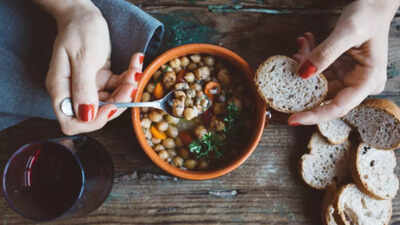ARTICLE AD BOX

Image credits: Getty Images
Chickpeas are one of the most popular and versatile legumes. They are popular in various cuisines and are known for their creamy and nutty flavour. From salads to curries, chickpeas are the star additions to many recipes.
However, many people report digestive issues such as gastrointestinal problems, after consuming the legumes.While one may think of the cause as an allergy or bad recipe, there is a completely natural reason as to why you have a gassy stomach after eating them. Find out below!
Why can't some people digest chickpeas?

Image credits: Getty Images
There are a variety of reasons why people are not able to digest chickpeas. From antinutrients to undercooking, any of the below-mentioned reasons could be why chickpeas make your stomach irritated.
High Oligosaccharides (FODMAPs)
Chickpeas are rich in sugars like raffinose and stachyose, which aren't fully digested by the small intestine. When these reach the colon, the gut bacteria ferment them, leading to bloating and discomfort. This problem is high in people with sensitive digestion or irritable bowel syndrome (IBS).
Antinutrients
Chickpeas contain antinutrients such as tannin, phytic acid and lectins that obstruct the nutritional quality of the legumes and hinder their absorption and thus cause digestive problems in the gut.
Sudden increase in fibre intake
According to the National Library of Medicine, chickpeas contain about 12.2 g of fibre, making them rich in the nutrient. Thus, a sudden increase in the consumption of chickpeas can overwhelm the gut and lead to bloating and gas.
Under or over cooking
One of the best ways to eat chickpeas is to cook them until they can be mashed with a spoon easily. While canned chickpeas are a bit pre-cooked and easier to digest, when you cook them from scratch, they might remain undercooked.
This can lead to digestive problems later and even make the stomach upset.
Tough skin
The outer layer of chickpeas consists of concentrated fibres and oligosaccharides that hinder digestion. Thus, in some cultures, people remove the peels to make them more digestible. '
What to do to easily digest chickpeas?

Image credits: Getty Images
Limit portion sizes
Since chickpeas are rich in fibre, if you are a person whose diet did not include high fibre before, it is better to begin eating the legumes in small portions. This will slowly introduce the digestive system to them and then gradually increase the amount.
Cook thoroughly
As mentioned above, overcooked chickpeas are easier to digest. Begin by soaking the dried chickpeas overnight, and then cook them until they can be mashed easily. This will decrease the case of bloating.
Combine with digestion-friendly herbs
In countries like India, chickpeas are cooked with herbs that aid in their digestion and make the process easier. This includes cumin, fennel seeds, asafoetida and even some ginger.
Try eating sprouted chickpeas
Eating sprouted chickpeas will reduce the amount of phytic acid and antinutrients in the legumes, making them easier to digest.
Experiment with other alternatives
If following all of the above steps still leads to bloating after eating chickpeas, then try experimenting with other legumes. Green, red or brown lentils are lower in oligosaccharides, and edamame or navy beans are easier to digest. Additionally, for those fans of hummus, white bean puree can be a good substitute.



.png)
.png)
.png)
















 3 hours ago
6
3 hours ago
6








 English (US) ·
English (US) ·